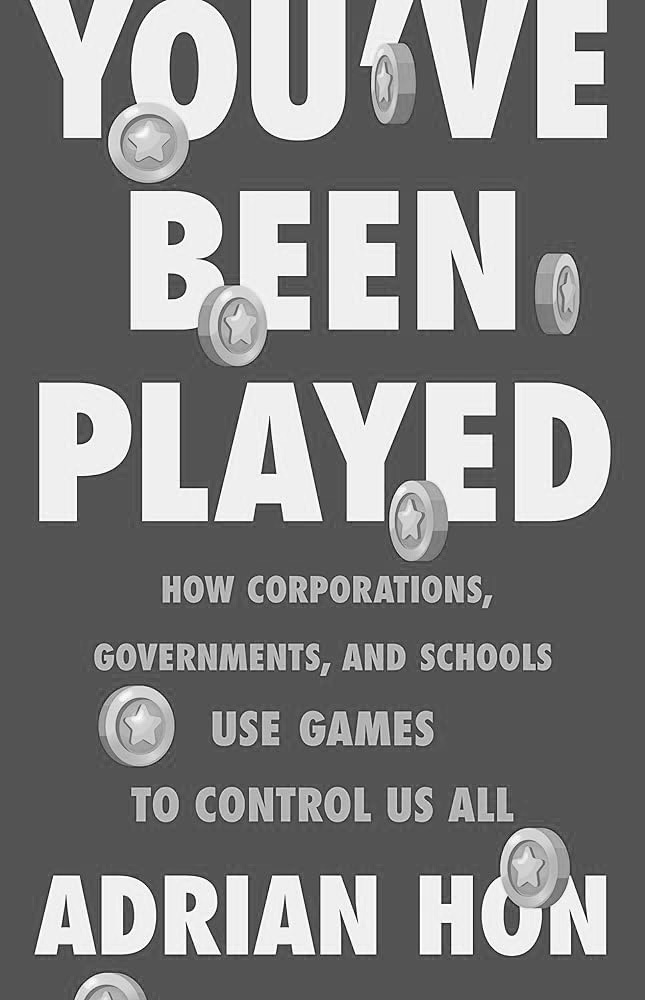On You've Been Played
Extrinsic Motivation and Self Reflection
Recently, I finished a book- You’ve Been Played by Adrian Hon- and would write some musings about the themes and arguments presented in the novel. The book itself is non fiction (I only really read non-fiction novels) and explores the concept of gamification and its dangerous proliferation throughout our daily lives through the avenues of government, private companies, professional careers, and recreational goals. Most generally, gamification is understood as “taking a normal activity and applying game mechanics and aesthetics to it, such as points, badges, levels, and so on.” Throughout the book, Hon segments gamification into specific types (ie: coercive) and varying settings, painting on overall picture that, while gamification can be positive, it is often dangerous and can lead to unexpected or just plain detrimental consequences. While he covers a lot of ground, I would like to focus on the segment of gamification and extrinsic motivation.
Prior to reading this book, I never really thought much about gamification. I am very familiar with games- video games being a staple of my childhood- but didn’t really think of games outside of entertainment value. And while I am constantly bombarded with gamification principles (ie: the notification on my Apple watch congratulating me on finishing my workout), I never really think much of them; these notification don’t really affect my motivation for my pursuits and are not much more than another notification that I have to dismiss after turning off do not disturb. It was only after reading this book had I realized how much gamification affects the lives of other people. One example, among dozens presented, is from a user addicted to Peloton in chapter 2 aptly titled “Level Up Your Life”: “I am on the bike almost every day, I am piling on work and I hesitate to take rest days ever as I’m dedicated to the streak achievements.” In examples like this, Hon paints the picture that gamification not only promotes extrinsic motivation, which is more short term and generally ineffective versus its intrinsic motivation counterpart, but also that gamification promotes unhealthy habits with “apps that will help ‘close your rings’ only add[ing] to this pressure to keep performing.”
To set the basis, I want to establish that I do not believe extrinsic motivation is inherently bad. Sure, extrinsic motivation may be weaker in comparison to intrinsic motivation (a viewpoint that Hon also has), but extrinsic motivation far surpasses having no motivation. In this scenario, I would rather someone cycle for achievement of virtual badges than not cycle at all- in the pursuit of those external achievements, that person is inadvertently improving his/her own health through being active. And if that person achieves similar benefits of cycling (physical health + dopamine rushes from achievement) as someone who is intrinsically motivated, who’s to say the extrinsically motivated person is someone “inferior” to the intrinsically motivated person? While extrinsic motivation is certainly not optimal, I understand that everyone has different motivating sources.
Now returning to the example, while Hon has a focus on gamification’s flaws, I want to focus on the individual flaw’s. While gamification definitely does have some negative repercussions on individuals, I believe it simply exacerbates the individual’s weaknesses. Gamification may be a helpful tool to encourage individuals in his/her pursuits, but I believe it is still solely the individual’s responsibility to continuously self reflect and perform audits on motives, schedules, and progress. And if there is some detachment between the assessments and the overall goal/vision of where he/she sees him/herself, there is some reframe of mindset and correction of habit required. In the Peloton example, is there self reflection for why streak achievements are so important for the individual? Is it a badge of honour that gives him/her a sense of accomplishment and fuzzy feel good? Is it a quantifiable metric of progress to depict improvement? Or is it simply extrinsic virtue signalling to show others how fit you are? Whatever the reason, gamification seems to have revealed weakness in the individual’s motivation and willingness to take the easy route and brainlessly subscribe to vanity metrics and not actively take time and slowly consider more pure and true intentions (ie: physical health, love for cycling, etc).
To solely pin responsibility on the gamification of everyday life feels to me like a cop out-an excuse to why life is not the way it is desired to be. Seeing gamification more as an external factor/influence, I see myself more biased towards stoicism and believe we all have a personal responsibility to control whatever it is we can control in our own lives. Sure, gamification elements may be addictive and time consuming, but we all have the self control to resist its detrimental qualities and the personal sovereignty to wholly pursue what is most meaningful to our own lives. This is not frictionless and I contend that it never should be. I believe the trials and tribulations- the process- to find our true selves in this ever so loud gamified world holds more value than if we are to simply stumble across some sort of enlightenment of who we truly are.
Yes, elements of gamification may be bad on society in terms of self-help streams, but I believe our own lack of self-awareness is even worse overall~


